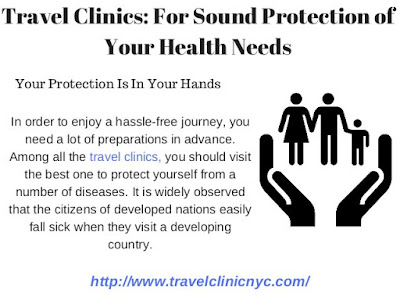Are
you planning a trip to an exotic far-flung location? Make sure
getting travel
shots
is
one of the top priorities of your travel checklist. Particularly, if
you’re traveling to places like the Caribbean, Africa, and South or
Central America.
Is
your holiday destination one of the regions mentioned? Then you must
get yourself acquainted with yellow
fever shots. First,
let’s learn, what is yellow fever? - Yellow fever is a tropical
disease caused by a virus, which is also known as a yellow jack or
yellow plague. It has four types, two common in Africa and two in
South America. However, only three out of four types have caused
havoc. Yellow
fever shots
are
crucial to minimizing the risk of transmission of yellow fever.
What is the yellow fever vaccine?
It
is a single-dose live, attenuated vaccine that is administered
through intramuscular or subcutaneous injection. Yellow fever vaccine
has the 17D strain of yellow fever hence it is also known as a 17D
vaccine. The vaccine is very safe and provides 90% of people with
quick, measurable immunity. While boosters for this vaccination are
suggested in every 10 years, the World Health Organization recommends
that a single dose of yellow fever vaccine is enough for immunity for
entire life. Any individual from nine months of age or more or who
are traveling to yellow fever prone region should get a yellow fever
vaccine.
Who
should not avoid getting yellow fever vaccine?
Generally,
a person should not get a yellow fever vaccine if he/she lives in an
afflicted region or does not plan a trip to yellow fever prone place.
The vaccine shouldn’t be administered to infants who are six months
old or younger, people suffering from primary immuno deficiencies,
symptomatic HIV infection, and who are undergoing immuno suppressive
treatments, with malignant neoplasms and transplant recipients.
Precautions
Special
care need to be taken while administering the vaccine to the
following:
- Elderly people over 60 years of age
- Pregnant women
- Breastfeeding mothers
- Asymptomatic HIV patients
- Renal or hepatic disease sufferers
- Infants from six to eight months old.
If
you get doubtful about the requirements regarding yellow fever, make
sure you clarify it with your doctor before getting yellow
fever shots.




















